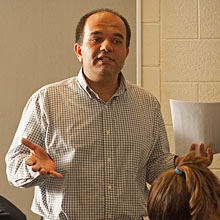Professor of Political Science
Chair of Political Science Department
Education
Ph.D., M.A. Maxwell School of Citizenship and Public Affairs, Syracuse University
MA, Philosophy of Science, Sharif University of Technology
About
Main Interests
- Comparative (Western-Islamicate) Political Theory
- Critical Theory
- Religions and Politics
Publications
Books
- Rouzegar-e Mabada [The Time that is out of Joint]. Tehran: Negah-e Moaser Publisher, 2023.
- Thoughtlessness and Decadence in Iran: A Sojourn in Comparative Political Theory. SUNY Press, 2019.
- Politics and the Criteria of Truth. Palgrave-Macmillan Press, 2010.
Selected Book Chapters and Articles
- “Political Hermeneutics; a theme in Farabi’s philosophy,” in Philosophical Hermeneutics and Islamic Thought; Contributions to Hermeneutics Series. S. Camilleri and S. Valrik (eds.). Switzerland: Springer (2022).
- “A Gloss on the Mirror, and a Proposal for Understanding Ibn al-Muqaffa’s Political Theory.” Iranology, Student Journal of Iranian Studies, University of Tehran 2(2), (2020): 146-166.
- “A Theoretical Component of Political Inegalitarianism in Perso-Islamicate Thought.” Journal of the Royal Asiatic Society, Series 3, 27/2 (2017): 225–254.
- “Razi on Reason and Political Authority: A Study in Medieval Persian Political Thought.” Iranian Studies 49, 1 (2016): 29-56.
- “Mirror for Princes.” Encyclopedia of Islam and the Muslim World. Macmillan Reference (2016).
- “The Unfolding of Unreason: J. Tabatabai’s Idea of Political Decline in Iran.” With M. Boroujerdi. Iranian Studies 48, 6 (2015): 949-966.
- “Razi’s Egalitarian Ideas.” Power and Identity, Studies on the Persianate World. Wydawnictwo Akademickie Dialog (2015), 135-164.
- “Metaphysics, Secularism and Cosmopolitan Democracy.” With E. K. Soltani in Iranian Identity and Cosmopolitanism; Spheres of Belonging, L. Stone (ed.). London: Bloomsbury (2014), 35-48.
- “On Sadi’s Treatise on Advice to the Kings.” With M. Boroujerdi in Mirror for the Muslim Prince; Islam and Theory of Statecraft. Syracuse: Syracuse University Press (2013), 45-81.
- “Adorno’s Dialectical Realism.” With Linda M. Alcoff. Symposium: Canadian Journal of Continental Philosophy 14, 2 (2010): 45-64.
- “Feminist Epistemologies/Interview with Linda M. Alcoff,” in Madreseh (Cultural and Philosophical Quarterly-Tehran) 2, 4 (2006): 50-63.
Book Reviews
- Yavari, Neguin. “Advice for the Sultan: Prophetic Voices and Secular Politics in Medieval Islam,” in Society for Contemporary Thought and the Islamicate World: SCTIW Review (2015).
- Abdolkarim, “Expansion of Prophetic Experience: Essays on Historicity, Contingency and Plurality in Religion,” in Society for Contemporary Thought and the Islamicate World: SCTIW Review (2014).
- Kamrava, M., “Iran’s Intellectual Revolution,” in Middle East Journal 63, 2 (2009): 327-328.
- Roxanne L. Euben, “Enemy in the Mirror: Islamic Fundamentalism and the Limits of Modern Rationalism,” in International Journal of Middle East Studies 37, 1 (2005): 109-110.
Teachings
Pols 207; Classical Political Theory
Pols 217; Medieval Political Thought
Pols 227; Modern Political Theory
Pols 263; Politics of the Middle East
Pols 337; Power and the State
Pols 347; Islamic Political Thought
Pols 357; Violence and Revolution
Pols 367; Politics and Religion
Pols 377; God and the Sovereign
Pols 401; (Senior Seminar) Conservative Political Thought
Pols 401; (Senior Seminar) Genuine Politic
Research
Comparative Political Theory is an emerging subfield of political theory which utilizes methodological pluralism—including historical, hermeneutic, and normative approaches—to facilitate mutual learning between western and non-western political thought. It transcends the monologue of western political theory and leans toward cross-cultural or “comparative” theorizing. In doing so, it explores ideas from seemingly dissimilar traditions, and inspects the relative merits of their different responses to human beings’ shared predicaments.
Political decadence or democracy deficit, I believe, comprises the shared predicament of contemporary Iranian and twentieth-century German societies. Accordingly, my book, Thoughtlessness and Religious Decadence in Iran: A Sojourn in Comparative Political Theory (SUNY, 2019), extends a hermeneutic site for dialogue between Perso-Islamicate traditions and modern western thought. By concentrating on the key concept of thoughtlessness, the volume puts Theodor Adorno, Leo Strauss, Mohammad Zakariya Razi and Abu Nasr Farabi in a posthumous dialogue with one another. The former thinkers deliberate in their own distinct ways on the state of decay in twentieth century Germany and against the background of Modern Enlightenment. The latter contemporaneous philosophers reflect within the context of Medieval Enlightenment on religion and religion-based decadence. Furthermore, these thinkers consider mass mentality (or, communal sense) as the primary variable in explaining political decadence. And, they all engage with Socrates—thus, the chapters’ movement between Adorno, Strauss, Farabi and Razi centers on Socrates and his idea of good life. This move helps the book offer modern-day interpretations of Farabi’s and Razi’s thoughts as potential and partial remedies for a contemporary decadence. The goal is to underline the critical points of similarity, difference, and even conflict between these thinkers, and help envision a “local”—or, “indigenous”—emancipatory project that, attentive to the specificities of the Iranian case, takes lessons from the western experience without blind imitation.
In my ongoing comparative political theory study, I investigate what I envision as a major cultural obstacle toward democratic life and mentality. Whereas in the above book I argue that the present-day democracy deficit is in part explainable by the variable of religion-cum-communal sense, my current research inspects the role of a component of the Perso-Islamicate tradition—that is, Perso-Islamicate mysticism—in solidifying authoritarian statecraft. Similarly, this inquiry is a practice in critical theory which examines a sedimented cultural block in order to bring its existence and malfunction to the level of consciousness and thus assist its removal.
